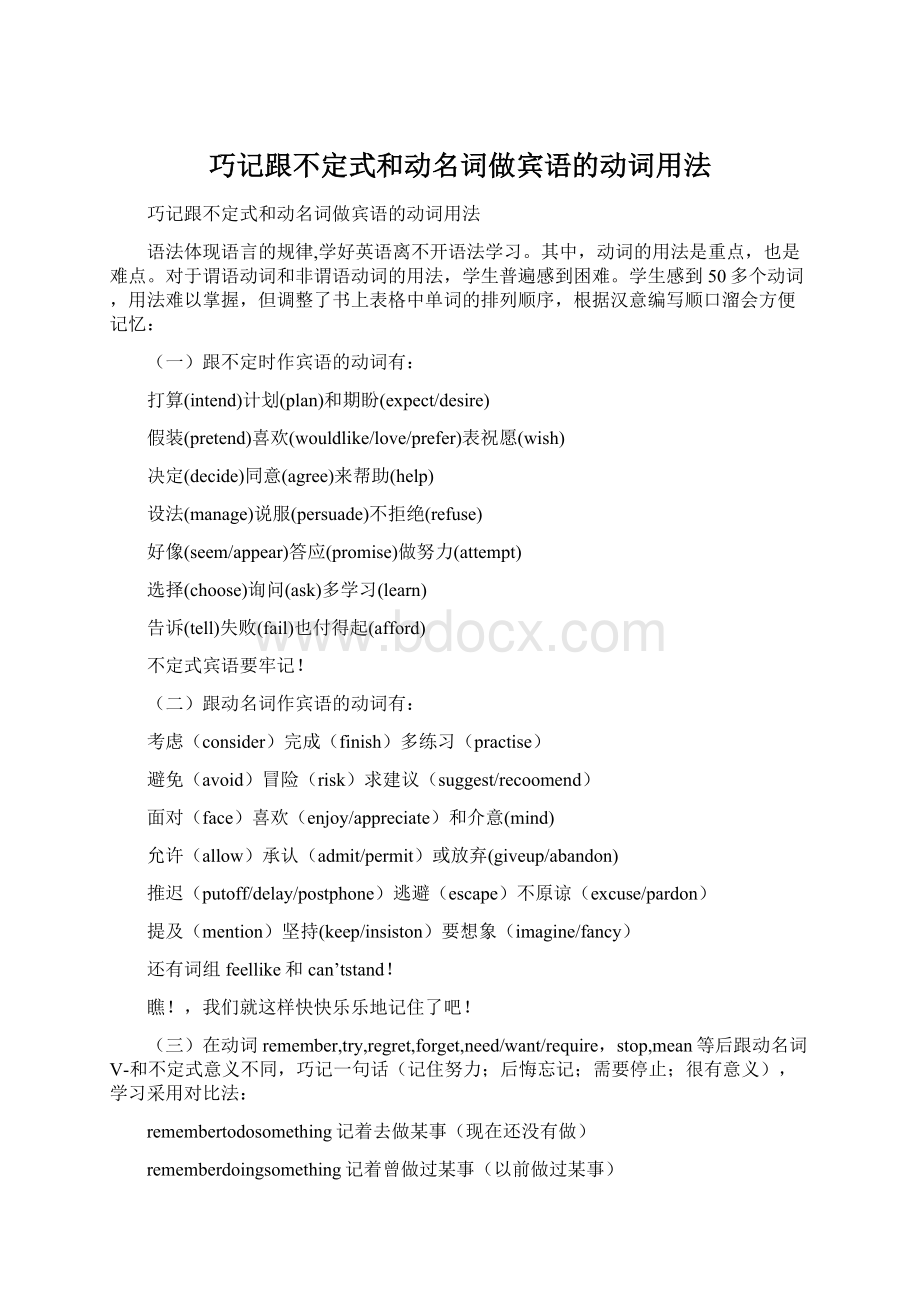巧记跟不定式和动名词做宾语的动词用法.docx
《巧记跟不定式和动名词做宾语的动词用法.docx》由会员分享,可在线阅读,更多相关《巧记跟不定式和动名词做宾语的动词用法.docx(9页珍藏版)》请在冰豆网上搜索。

巧记跟不定式和动名词做宾语的动词用法
巧记跟不定式和动名词做宾语的动词用法
语法体现语言的规律,学好英语离不开语法学习。
其中,动词的用法是重点,也是难点。
对于谓语动词和非谓语动词的用法,学生普遍感到困难。
学生感到50多个动词,用法难以掌握,但调整了书上表格中单词的排列顺序,根据汉意编写顺口溜会方便记忆:
(一)跟不定时作宾语的动词有:
打算(intend)计划(plan)和期盼(expect/desire)
假装(pretend)喜欢(wouldlike/love/prefer)表祝愿(wish)
决定(decide)同意(agree)来帮助(help)
设法(manage)说服(persuade)不拒绝(refuse)
好像(seem/appear)答应(promise)做努力(attempt)
选择(choose)询问(ask)多学习(learn)
告诉(tell)失败(fail)也付得起(afford)
不定式宾语要牢记!
(二)跟动名词作宾语的动词有:
考虑(consider)完成(finish)多练习(practise)
避免(avoid)冒险(risk)求建议(suggest/recoomend)
面对(face)喜欢(enjoy/appreciate)和介意(mind)
允许(allow)承认(admit/permit)或放弃(giveup/abandon)
推迟(putoff/delay/postphone)逃避(escape)不原谅(excuse/pardon)
提及(mention)坚持(keep/insiston)要想象(imagine/fancy)
还有词组feellike和can’tstand!
瞧!
,我们就这样快快乐乐地记住了吧!
(三)在动词remember,try,regret,forget,need/want/require,stop,mean等后跟动名词V-和不定式意义不同,巧记一句话(记住努力;后悔忘记;需要停止;很有意义),学习采用对比法:
remembertodosomething记着去做某事(现在还没有做)
rememberdoingsomething记着曾做过某事(以前做过某事)
trytodosomething努力、尽力做某事
trydoingsomething试着做某事(看能否达到预期的结果)
stoptodosomething开始做某事(停下正在做的事,开始做另一事)
stopdoingsomething停止做某事(停止正在做的事)
regrettodosomething对将来做的事感到遗憾、惋惜
regretdoingsomething对已经做过的事感到后悔
meantodosomething打算,想,意图…
meandoingsomething意味着
want/require/needtobedone某事需要做
want/require/needdoing某事需要做(这时动名词和主语之间有动宾关系,
如:
Theroomneedscleaning/needstobecleaned)
can’thelptodosth.不能帮助做某事
can’thelpdoingsth.禁不住做某事
(四)请牢记在下列固定句式中,动词用V-ing式:
Thereisnopointarguingfurther.再争辩下去没有意义。
Itisnogooddoingthat.那样做没有用。
Itisnousetellinghisfatheraboutit.告诉他父亲那件事没用。
[小试牛刀]
1.Theboydecided______inShanghai,whichmadehisfatheralittlesurprised.
A.nottoworkB.tonotworkC.notworkingD.workingnot
2.—Wouldyoumind______thedoor?
—Ofcoursenot.
A.IopeningB.metoopenC.formetoopenD.myopening
3.Asyouknow,here,missingabusmeans______foranotherhour.
A.waitingB.towaitC.waitD.tobewaiting
4.She______goingoutforawalk,butI’dratherstayathomewatchingTV.
A.wantedB.askedC.hopedD.suggested
5.Sorry.Wedon’tallow______here.
A.smokingB.havingsmokedC.tosmokeD.tobesmoked
6.Inwinter,manyanimalsmanage______withouteatingformanymonths.
A.toliveB.tohavelivedC.havinglivedD.living
7.Myfatherinsisted_____althoughwewereverytired.
A.walkhomeB.towalkhomeC.onwalkinghomeD.inwalkinghome
8.Afterhehadworkedseveralhours,hestopped_____acupofcoffeetorefreshhimself.
A.todrink B.drinkingC.drink D.drank
9.Althoughswimmingishisfavoritesport,yethedoesn’tlike_____today.
A.toswim B.swimmingC.swim D.tohaveswim
10.Iregret_____youthatthesportsmeethasbeenputoff.
A.telling B.totellC.tell D.told
11.Shedesiresnot_____foranhour.
A.disturb B.tobedisturbC.tobedisturbed D.tohavedisturbed
(五)、不定式省略to的几种情况
一、使役动词与to的省略
当不定式用于let,make,have等使役动词后作宾语补足语,不定式必须省略to。
如:
Letmehaveanothercupoftea.给我再来一杯茶。
Shehadhimdigawaythesnow.她让他把雪挖走。
Theymadehimtellthemeverything.他们强迫他把一切全告诉他们。
但是,当使役动词用于被动语态时,其后的不定式则必须要带to。
如:
他被迫一天工作20小时。
误:
Hewasmadeworktwentyhoursaday.
正:
Hewasmadetoworktwentyhoursaday.
注意,表示使役意义的let和have很少用于被动语态。
另外注意,force,oblige等虽然也表示“使”,但它们后用作宾语补足语的不定式必须带to。
如:
Theyforcedhertosignthepaper.他们强迫她在文件上签字。
Thelawobligedparentstosendtheirchildrentoschool.法律要求父母送子女上学。
二、感觉动词与to的省略
当不定式用于表示感觉的动词feel,hear,notice,observe,see,watch,lookat,listento等作宾语补足语时,不定式必须省略to。
如:
Weallfeltthehouseshake.我们都感觉这房子在震动。
Iheardhimgodownthestairs.我听见他下楼了。
Didyounoticeherleavethehouse?
她离开屋子你注意到了吗?
Iwatchedhergetintothecar.我看着她上了车。
但是,当feel后用作宾语补足语的不定式为tobe时,则不能省略to。
如:
Theyallfelttheplantobeunwise.他们都认为这个计划不明智。
注意,当这些动词变为被动语态时,不定式前的to不能省略。
如:
Theywereheardtobreakaglassinthenextdoor.听见他们在隔壁打破了一个玻璃杯子。
另外,若用作宾语补足语的不定式为完成式,则通常应带to。
如:
Inoticedhertohavecomeearly.我注意到她来得很早。
三、介词except/but与to的省略
当不定式用作介词except或except的宾语时,该不定式有时带to,有时不带to,情形比较复杂,大致原则是:
其前有do,不定式不带to;其前没有do,不定式通常带to。
如:
HelikesnothingexcepttowatchTV.除了看电视外,他什么都不喜欢。
Ithadnoeffectexcepttomakehimangry.除惹他生气外,没产生任何效果。
There’slittlewecandoexceptwait.除了等待我们没有什么办法。
Icoulddonothingexceptagree.我除了同意,没有别的办法。
四、help与to的省略
当动词help后跟一个不定式用作宾语或宾语补足语时,不定式可以不带to,也可以不带to。
如:
Canyouhelp(to)carrythistableupstairs?
你能帮忙把桌子搬到楼上去吗?
Ihavelostmywatch.Willyouhelpme(to)lookforit?
我把表丢了,你能不能帮我找一下?
但是,当help用于被动语态时,其后不定式必须带to。
如:
Milliewashelpedtoovercomeherfearofflying.米利被帮助克服了她的飞行恐惧。
另外,当不定式为否定式时,其中的to通常不宜省略。
如:
HowcanIhelpmychildrennottoworryabouttheirexams?
我怎样才能帮助我的孩子们不为他们的考试着急呢?
五、固定搭配与to的省略
1、Whynot...?
=Whydon'tyou...?
习惯上接动词原形,不能接带to不定式或现在分词,主要用于表示同意、赞成、劝诱等,其意为“为什么不……呢”。
如:
Whynotgowithhim?
=Whydon'tyougowithhim?
为什么不和他一起去呢?
2、hadbetter...,最好做某事,如:
Youhadbetterstayhere.你最好呆在这里。
3、“wouldrather+动词原形”意为“宁愿做某事”。
如:
We’dratherstayathome.我们宁愿呆在家里。
Iwouldrathernottellhim.我宁愿不告诉他。
4、prefer+不定式+ratherthan+动词原形,其意为“宁愿做某事而不愿做另一事”。
如:
Iprefertowalkthereratherthangobybus.我宁愿走着去,而不愿坐公共汽车去。
Hepreferstoreadratherthanwatchtelevision.他喜欢读书而不喜欢看电视。
但,prefer+动名词+to+动名词,其意为“宁愿做某事而不愿做另一事”。
如:
Heprefersswimmingtoridingasasport.作为一项运动项目,他更喜欢游泳而不是骑马。
注:
这类结构的prefer前有时也可用would,should等。
如:
Wewouldpreferplayingoutdoorstowatchingtelevision.我们宁愿在外面玩而不愿看电视。
习惯上只接动名词(V+ING)作宾语的动词
常用动词有:
admit承认、advise建议、allow允许、appreciate感激、avoid避免、consider考虑delay推迟、deny否认、discuss讨论、dislike不喜欢、enjoy喜爱、escape逃脱、excuse原谅、fancy设想、finish完成、forbid禁止、forgive原谅、giveup放弃、imagine想像、keep保持、mention提及、mind介意、miss没赶上、pardon原谅、permit允许、practise练习、prevent阻止、prohibit禁止、putoff推迟、report报告、risk冒险、stop停止、suggest建议、understand理解等,这些动词后面常接动名词作宾语。
另在一些固定搭配中也常接动名词作宾语。
如:
1、insistondoing坚持要做某事。
如:
Heinsistedondoingitbyhimself.他坚持要一个人做。
2、havedifficulty/trouble(in)doingsth.相当,意为“在做某事方面有困难、麻烦”。
如:
Shehasdifficulty/trouble(in)learningmathswell.她学好数学有困难。
3、bebusy(in)doingsth.忙于做某事。
如:
Theyarebusy(in)doingwiththetrouble.他们正在忙于处理那个问题。
【典型用法实例】
Iadvisewaitingafewmoredays.我建议再等几天。
Theyavoidedmentioningthatname.他们避免提到那个名字。
Hedeniedhavingbeenthere.他否认到过那里。
Hedislikedbeinglaughedat.他不喜欢别人笑他。
I’veenjoyedseeingyouandtalkingaboutoldtimes.我见到你一起谈往事非常高兴。
Wedon’tallow(permit)smokingonthisplane.在这架飞机上我们不允许抽烟。
Iadmitbreakingthewindow.我承认窗子是我打破的。
Trytoimaginebeingonthemoon.设法想像你是在月球上。
HemadeaNewYear’sresolutiontogiveupsmoking.他下了新年决心要戒烟。
Theyriskedlosingeverything.他们冒失去一切的危险。
Hetriedtoescapebeingpunished.他设法逃避惩罚。
Youshouldn’tkeepthinkingaboutit.你不应老想着这事。
Wouldyoumindgoingwithher?
你可否同她一起去?
Ican’tunderstandneglectingchildrenlikethat.对孩子那样毫不经心,我不能理解。
Weonlymissedseeingeachotherbyfiveminutes.我们只因差五分钟而未能见面。
Isuggestdoingitinadifferentway.我建议以另一种方法做这事。
Iputoffwritingfromdaytoday.我日复一日地推迟写它。
【几点用法说明】
(1)有的动词后接动名词作宾语时通常带有逻辑主语:
Therainpreventedhiscoming.下雨使他不能来。
Excusemyopeningyourletterbymistake.原谅我不慎把你的信拆开。
(2)有的动词(如advise,allow,forbid,permit等)后虽然不能直接跟不定式作宾语,但可接不定式作宾语补足语:
Headvisedbuyingacomputer.他建议买台电脑。
Headvisedhertobuyacomputer.他建议她买台电脑。
(3)有些动词(如consider,understand,discuss等)虽不接不定式作宾语,却可接“疑问词+不定式”作宾语:
Haveyouconsideredhowtogetthere?
你是否考虑过如何到那儿去?
Shedoesn’tunderstandhowtolookafterhim.她不知道应如何照顾他。
Wediscussedwhattodoandwhereweshouldgo.我们讨论了该怎么办及到哪里去。
习惯上接不定式作宾语的动词
通常只接不定式(而不是动名词)作宾语的动词有:
afford负担得起、agree同意、arrange安排、ask要求、care想要、choose决定、decide决定、demand要求、determine决心、expect期待、fail未能、help帮助、hesitate犹豫、hope希望、long渴望、manage设法、offer主动提出、plan计划、prepare准备、pretend假装、promise答应、refuse拒绝、want想要、wish希望等。
如:
Ican’taffordtobuyacar.我买不起汽车。
Sherefusedtohelpme.她不肯帮助我。
Heagreedtocomeoverrightaway.他同意马上就来。
Hemanagedtoavoidanaccident.他设法避免了一次事故。
Theboydecidednottobecomeasailor.那孩子决定将来不当水手。
Hechosenottogoabroaduntillater.他决定晚点出国。
Hepretendednottoknowthefacts.他佯装不知实情。
v+sbtodosth用法
通常可带不定式作宾语补足语的动词有advise建议,allow允许,ask要求、叫,bear忍受,beg请求,cause引起,command命令,encourage鼓励,expect期待,forbid原谅,force强迫,get使,hate讨厌,help帮助,intend打算,invite邀请,leave离开,need需要,oblige逼迫、责成,order命令,permit准许、允许,persuade说服,prefer宁愿,request要求,remind提醒,teach教,tell告诉,trouble麻烦,want想要,warn警告,wish希望、hope希望等:
Hedidn’tallowthestudentstogothere.他没让学生们去那儿。
Heorderedtheworktobestartedatonce.他命令马上开始工作。
Heforbademetousehiscar.他不准我用他的小车。
Thedoctorwarnedhimnottosmoke.医生告诫他不要抽烟。
Myparentsencouragedmetostudyabroad.父母鼓励我出国留学。
Itriedtopersuadehimtoleave,buthewouldn’tlisten.我想劝他离开,可他不听。
注意:
promisesbtodosth
该结构中的不定式的逻辑主语不是其前的宾语sb,而是句子主语,所以严格说来,此句中的不定式不是宾语补足语,如Hepromisedmetogo.的意思是“他答应我他去”,而不是“他答应让我去”。
专题练习:
1、Themaninsisted________ataxiformeeventhoughItoldhimIlivednearby.
A.findB.tofindC.onfindingD.infinding
2、Theoldman,________abroadfortwentyyears,isonthewaybacktohismotherland.
A.toworkB.workingC.tohaveworkedD.havingworked
3、Myadvisorencouraged________asummercoursetoimprovemywritingskills.
A.formetakingB.metakingC.formetotakeD.metotake
4、________inthequeueforhalfanhour,Tomsuddenlyrealizedthathehadlefthiswalletathome.
TowaitB.HavewaitedC.HavingwaitedD.Tohavewaited
5、Havingbeenillinbedfornearlyamonth,hehadahardtime________theexam.
A.passB.topassC.passedD.Passing
6、AccordingtoarecentU.S.survey,childrenspendupto25hoursaweek________TV.
A.towatchB.towatchingC.watchingD.Watch
7、CertainlyIpostedyourletter—Iremember______it.
A.postingB.topostC.tobepostingD.haveposted
8、MrSmithdislikes______suchclothesbuthiswifelikes_____them.
A.towear,towearB.towear,wearingC.wearing,towearD.wearing,wear
9.Iregret_______whatIsaid.Ishouldn’thavesaidit.
A.tosayB.sayingC.tobesayingD.said
10、Hewasluckyandnarrowlymissed_______.
A.toinjureB.InjuringC.tobeinjuredD.beinginjured
11、Hecan’tmakehimself_______.HisspokenEnglishreallyneeds________.
A.understand,improvingB.understood,improving
C.understand,toimproveD.understood,toimprove
12、Welookedeverywhereforthekeys,buttheyarenowhere______.
A.tofindB.tohavefoundC.tobefoundD.beingfound
13、Pleaseremember______theplantswhileI’maway.
A.wateringB.tobewateringC.towaterD.beingwatering
14、I’mlearning______acake.Canyouexplain______one?
A.tomake,tomakeB.howtomake,tomakeC.tolearn,howtomakeD.making,making
15、“Wouldyouliketocomeforawalkwithme?
”“I’dprefer_____,thankyou.”
A.nottoB.tonotC.notD.can’t